Justin Welby promises church child abuse investigation, survivors say it's not enough

Survivors of sex abuse in the Church have criticised the Archbishop of Canterbury's pledge that the Church could launch its own investigation into abuse, saying it does not go far enough.
The Most Rev Justin Welby said in a private meeting with clerical abuse survivors that if the public inquiry headed by New Zealand judge, Justice Lowell Goddard, did not call him first to give evidence, he would look at setting up a review himself within the Church.
Lucy Duckworth, chairman of Macsas, which supports women and men who have been sexually abused as children or adults by ministers, clergy or others under the guise of the Church, welcomed the Archbishop's comments but said it was too little and had come too late.
Macsas is representing survivors' interests in the public inquiry and was at the meeting where the Archbishop gave his pledge.
She told Christian Today: "We welcome any engagement he is willing to give us but we still remain very disappointed that this has come very late and it is all he is offering. There needs to be an independent inquiry. The Church is not capable of investigating itself, no institution is. We have been calling for decades for a Church-funded independent inquiry and they consistently refuse to give us one. The Church needs to offer us a lot more."
Justice Goddard's inquiry is expected to last five years.
In 2010, the Church published the results of an abuse investigation which covered 30 years and found 13 cases that needed reporting to authorities, resulting in criticisms from survivors that more scrutiny was needed.
Home Secretary Theresa May ordered the independent inquiry in July 2014 following claims of cover-ups of abuse involving public figures. It opened last week and Justice Goddard called for anyone with information about sexual abuse cases to come forward.
Preaching at York Minster yesterday during the summer meeting of General Synod, Archbishop Welby said: "Of course we must acknowledge and grieve our sins, sins of commission and omission, of lack of transparency and arrogance, especially as we are aware of sins against children and vulnerable adults.
"But the good news which enables us to come to the Eucharist with confidence, and hold our filthy, empty hands to find them cleansed and filled, and called to service is that God has called us, has called His church, has sanctified us, and sends us to be his prophetic people."
Later yesterday, the synod voted to bring back its ancient powers to defrock vicars who break the law as a demonstration of its commitment to ending child abuse. Defrocking, or deposition from Holy Orders, was the strongest punishment a church court could mete out before it was dropped from clergy discipline 12 years ago.
The Bishop of Durham Paul Butler said the Church must accept that the abolition of defrocking could have been a mistake and that it no longer looks wise in the light of abuse cases.











